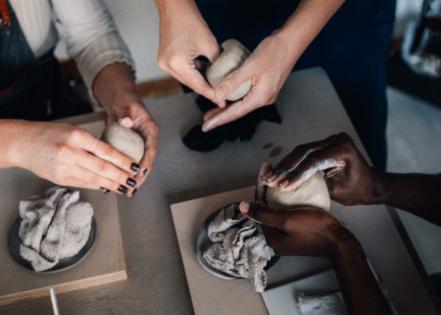From ceramics to barber cuts, community-based programs support people skeptical of mental health
Published in Slideshow World
Subscribe
From ceramics to barber cuts, community-based programs support people skeptical of mental health
Drew Muse witnessed several emotional breakthroughs between Black mothers and daughters—but it wasn't in a therapist's office. It was during yoga retreats held by The Black Women's Yoga Collective, a women's wellness group based in Los Angeles and New York City that also offers virtual programming.
"They were able to have conversations that they've never been able to have before with each other," Muse, the organization's community coordinator, told Stacker. "Some were able to create a deeper understanding with each other about certain issues in their lives, certain things that they have or have not been able to process."
Many people of color and marginalized groups are averse to receiving talk therapy, especially among Hispanic, Black, and Asian adults. This is due to distrust of the medical system, concerns about cost, and the stigma of seeking health in their respective communities, among many other reasons, according to a 2023 survey of over 6,000 adults by KFF. Instead, many people of color are turning to community care options for mental health concerns.
Wysa combined research and expert insights to better understand why talk therapy is stigmatized and distrusted among some demographics and how to bridge the gap with community care.
A study of 2,328 adults published in 2021 in the journal Annals of Family Medicinefound that non-Hispanic Black and Hispanic respondents were respectively 73% and 49% more likely to report a mistrust of medical professionals compared to non-Hispanic white adults. Regarding mental health, KFF's 2023 study noted that only 39% of Black respondents and 36% of Hispanic respondents with mental health concerns had received help since 2020. Meanwhile, half of white adults said they sought mental health services, which shows they were more likely to receive therapy than Asian, Hispanic, and Black adults during the same period.
One reason is that people tend to seek out therapists who are conscious of their background, but 55% of Asian and 46% of Black adults have had difficulty finding a professional who understands their specific experiences, according to KFF. In 2021, the American Psychological Association reported that 4 in 5 psychologists are white, while less than 10% are Black, Asian, Hispanic, or of another racial or ethnic group. American Indian or Alaska Native and Native Hawaiian or Pacific Islander psychologists constituted the least, at 0.13% and 0.03%, respectively.
Another major reason is that communities of color have stigmas surrounding seeking mental health help. For instance, many Hispanic or Latino men see seeking therapy as a sign of weakness, according to the National Institutes of Health.
"In the Filipino community, and overall the [Asian American and Pacific Islander] community, it's still seen as taboo or not proud to talk about it," Eddy M. Gana, clinical program manager of mental health at the LA-based nonprofit Search to Involve Pilipino Americans, told Stacker. "There's a sense of shame when asking for help."
Visit thestacker.com for similar lists and stories.
Care based on community values
Community care helps individuals through mutual support and nurtures the well-being of the larger community. This approach, often used by people of color and LGBTQ+ communities, is usually based on the community's values, supporting it through mutual aid, healing, and faith.
It is an effective way to reach underserved communities because of the amount of trust involved—especially since many communities of color distrust the medical system. Community care has also been around for generations, thanks to the wisdom and trust that exists within the community.
Cleveland-based certified nurse practitioner Mary Louise Tatum, who specializes in psychology, has found establishing trust difficult but crucial for community-based programs.
"It's very slow and very tedious, but once they open up, you got to be ready for the blast of emotion," Tatum told Stacker. "Because the emotions are there, and you got to realize the emotions aren't personal. Sometimes that stuff is still bottled up."
Through community care initiatives, people of color can find programs and professionals who understand their values, backgrounds, and the history of their culture. In their role at SIPA, Gana counsels many Filipino families through their children coming out as queer or transgender. Gana is Filipino and came out as nonbinary to their own family recently.
They use that experience to inform their approach to other families seeking care, pointing out that many aspects of Filipino culture are gender-neutral. For instance, there are Filipino Indigenous healers called babaylan who transcend gender. The Tagalog language doesn't use the pronouns "she" or "he"; instead, it uses the gender-neutral "siya" (pronounced "sha").
Gana pointed out that language accessibility is a huge issue for the Filipino and Latino communities that SIPA serves in LA. Although they often work with their patients in Tagalog, they noted that the culture has many other languages, including Ilocano and Kapampangan.
"We need folks who are culturally competent, who are fluent in the multiple languages that we have," they said. "There'd be some families that would meet where their first language is Kapampangan, or Bisaya, which is the southern region of the Philippines; their second language is Tagalog; and their third language is English."
The many shapes of showing up for each other
Community care takes several forms—and it's not always formal talk therapy. While Gana counsels families and adolescents, SIPA offers sound baths, meditation, and support groups.
The nonprofit has also been running a program in LA schools called Walang Hiya, or "without shame" in Tagalog, which was originally considered a derogatory term. However, Gana said the program wanted to reclaim it through this program that educates high school-aged youth about depression, anxiety, and the impacts of racism.
The BWYC holds yoga classes, sound healing events, self-care spaces, and retreats emphasizing community connection. Muse said BWYC keeps the admissions costs low—or free—to ensure the wellness events are accessible to the community.
"We tailor to the needs of the Black community by addressing certain issues that might not be talked about in different wellness spaces, around Blackness and around the ways that microaggressions happen in the workplace and out in the world," she said. "[We're] really just creating a space where Black people can feel heard, seen, and understood."
Some versions of community care look unexpected. LA-based POT hosts therapeutic pottery workshops in an inclusive space that aims to uplift communities of color. The National Alliance on Mental Illness started the online resource NAMI Sharing Hope to support those of Black and African ancestry.
Another type of community care is meeting the community where it already goes. For the Black community, Tatum said barbers are "the unofficial therapists. They're the ministers. They're unofficial everything." In 2023, she started Beyond the Cut, a Northwest Ohio program to provide mental health training to barbering students, partnering with LaBarberia Institute in Mayfield Heights, Ohio.
Tatum taught the barber college students about mental health and community issues, such as experiencing homelessness and dealing with health insurance. After these talks, many of the students, predominantly Black men around 18 to 30, came to her for personal advice.
"I thought I was going to give them a skill set to work with their clients," she said. "It ended up that a lot of them have traumas, so it was a lot more than what I expected. … I had to help them help themselves first."
Tatum brought in a Mental Health First Aid trainer for the students and instructors to learn how to respond to mental health and substance use challenges. At the end of the training, they received a certificate, an accomplishment she noticed the students were particularly proud of.
"Some of them are putting their certifications out there with their student barber license on the mirror," Tatum said. "And that gave me pride walking to the barber school and seeing them putting up their Mental Health First Aid certificate. … It's not easy. It's a lot of work, but they did it."
Story editing by Carren Jao. Copy editing by Paris Close. Photo selection by Lacy Kerrick.
This story originally appeared on Wysa and was produced and distributed in partnership with Stacker Studio.









Comments